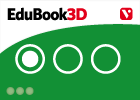Cargando...
Recursos educativos
-
Nivel educativo
-
Competencias
-
Tipología
-
Idioma
-
Tipo de medio
-
Tipo de actividad
-
Destinatarios
-
Tipo de audiencia
-
Creador
Lo más buscado
- Letras D
- Clasificación del reino animal
- Arte megalítico
- Actividades de repaso en sexto grado
- Arte gótico para tercero
- Imprimir material
- Repaso de fracciones
- Gremios edad media
- Acudits infantils
- lectura para niños
- Clasificación de los animales
- Cine infantil
- actividades ortografía
- Huesos del cuerpo humano
- Inventos del siglo xv
-

Entry test 04 - The Roman Empire
EduBook Organización
- 4203 visitas
Answer the following questions: What were the barbarian invasions? What effect did the invasions have on the Roman Empire? Where did each barabarian tribe establish a new kingdom? What aspects of the…
-

Romanesque art on the Iberian Peninsula
EduBook Organización
- 3872 visitas
5.1. Architecture Romanesque art first appeared on the Iberian Peninsula along the new pilgrim routes going to Santiago de Compostela. The best-known Romanesque buildings include: The Cathedral of…
-

Answer. The Iberian Peninsula: a meeting of cultures
EduBook Organización
- 3049 visitas
Remember what you have studied in this section and answer the questions: Why is medieval Spain referred to as a meeting place of cultures? What was the School of Translators in Toledo? What were Jewish…
-

Answer. The Spanish Empire: Philip II (1556-1598)
EduBook Organización
- 2921 visitas
Review what you have studied and do the following activities: Which territories made up the Spanish Empire during the reign of Philip II? How did this monarch rule his kingdoms? Where were centres of…
-

Observe. Cities and empires of Mesopotamia
EduBook Organización
- 2601 visitas
Look at the map and answer the questions: Which rivers cross Mesopotamia? Why were the rivers important for the development of urban civilisations in this area? Describe the succession of kingdoms and…
-

The birth of feudal Europe
EduBook Organización
- 2489 visitas
1.1.The fragmentation of the Carolingian Empire At the end of the 8th century, Charlemagne, the king of the Franks, unified large parts of western Europe and proclaimed himself emperor. However, on his…
-

Choose. The origins of feudalism
EduBook Organización
- 2269 visitas
Which of the following definitions refer to the origins of feudalism: In order to govern and maintain their kingdoms united, monarchs needed the support of the nobles, with whom they established a…
-

Answer. The Catholic Monarchs in Spain
EduBook Organización
- 2099 visitas
Who were the Catholic Monarchs? Why were they authoritarian rulers? What was Spain's capital at this time? How many kingdoms existed in the Iberian Peninsula at the beginning of the 15th century?…
-

Monasteries
EduBook Organización
- 2060 visitas
Monasteries and convents In the Middle Ages, most people in the Christian kingdoms of northern Spain were Christians. The Church was very important in their lives. Many men and some women dedicated…
-

Final self-evaluation 6 - Feudal Europe
EduBook Organización
- 1950 visitas
Which aspect of the subject of feudal Europe do the following sentences refer to?: The castles were fortified residences of feudal lords and were often located in the centre of their territories. In…
Te estamos redirigiendo a la ficha del libro...












